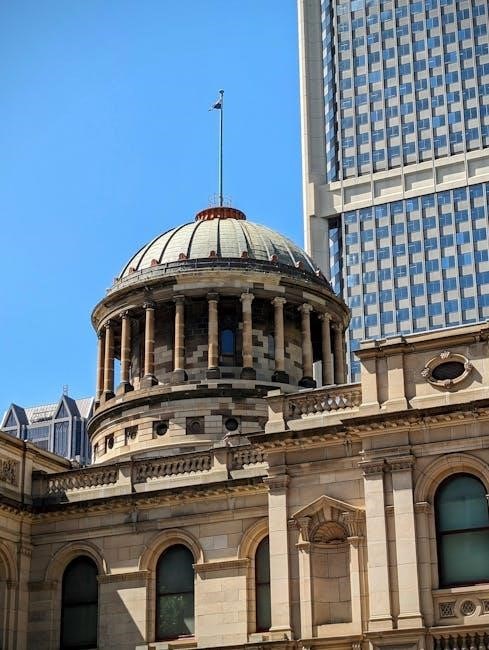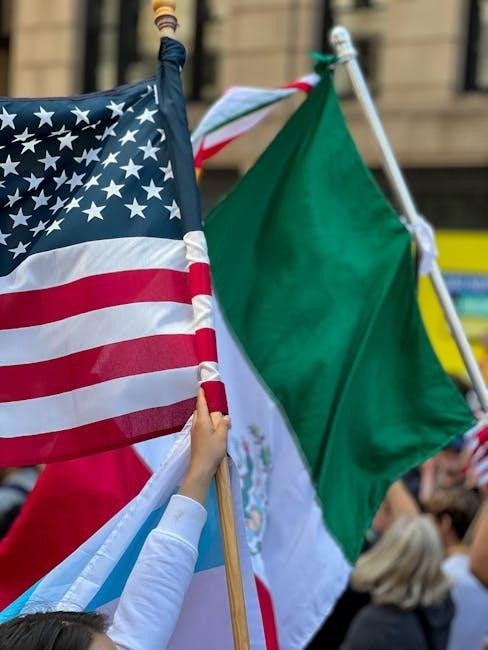William H. Pryor Jr. is a distinguished jurist serving as Chief Circuit Judge of the U.S. Court of Appeals for the Eleventh Circuit since 2005. Known for his originalist judicial philosophy, Pryor has significantly influenced legal discourse, particularly on issues like international law’s role in domestic jurisprudence. His academic contributions include teaching at the University of Alabama School of Law and delivering notable lectures, such as the Dunwody Distinguished Lecture. Pryor’s critiques of international law’s application in U.S. courts highlight his commitment to constitutional values and national sovereignty.
1.1. Background and Career Overview
William H. Pryor Jr; is a prominent jurist with a distinguished career in law. Born on April 26, 1962, in Mobile, Alabama, he graduated from Tulane Law School and began his legal career in private practice. Pryor served as Alabama’s Deputy Attorney General before his appointment to the Eleventh Circuit Court of Appeals in 2005. He later became Chief Circuit Judge, overseeing significant cases and advocating for judicial modesty. Pryor has also taught law at the University of Alabama, blending academic and judicial expertise.
1.2. Role in International Law Discussions
William H. Pryor Jr. has been a vocal figure in debates about international law’s influence on U.S. jurisprudence. He has criticized the incorporation of foreign legal principles into domestic courts, arguing they often conflict with American constitutional values. Pryor emphasizes the importance of national sovereignty and the primacy of U.S. law. His critiques have sparked significant discussions in legal circles, particularly regarding the balance between international norms and domestic legal frameworks. His views reflect a cautious approach to global legal influences.

William H. Pryor Jr. on International Law
William H. Pryor Jr. strongly criticizes the use of international law in U.S. courts, arguing it conflicts with constitutional values and undermines national sovereignty.
2.1. Critique of International Law in U.S. Courts
William H. Pryor Jr. critiques the incorporation of international law in U.S. jurisprudence, asserting it often conflicts with American constitutional principles and national sovereignty. He argues that foreign legal principles should not influence domestic legal decisions, as they may undermine the Founding Fathers’ intent and the rule of law established by the Constitution. Pryor’s stance reflects his commitment to originalism and judicial modesty, emphasizing the importance of adhering to U.S. legal frameworks without external interference.
2.2. The Debate on the Use of International Law in Domestic Jurisprudence
William H. Pryor Jr. actively participates in the debate over international law’s role in U.S. courts, arguing that foreign legal principles should not influence domestic jurisprudence. He contends that such practices may erode national sovereignty and contradict U.S. constitutional values. Pryor’s originalist approach emphasizes interpreting the Constitution based on its original meaning, rejecting the integration of international norms that could alter foundational legal principles. His views reflect a broader discussion among jurists about balancing global legal standards with domestic legal frameworks.
2.3. Foreign Legal Principles and U.S. Constitutional Values
William H. Pryor Jr. asserts that foreign legal principles often conflict with U.S. constitutional values, undermining national sovereignty. He argues that incorporating international law into domestic jurisprudence risks diminishing the authority of the Constitution, as it may introduce norms inconsistent with the Founding Fathers’ intent. Pryor’s originalist approach emphasizes adhering to the Constitution’s original meaning, rejecting external influences that could erode its integrity. This perspective aligns with his broader critique of international law’s role in U.S. courts, advocating for a jurisprudence grounded solely in domestic legal frameworks.
Judicial Philosophy and International Law
William H. Pryor Jr. advocates for an originalist approach, rejecting foreign legal influences in U.S. jurisprudence. He believes international law often conflicts with constitutional values, undermining national sovereignty.
3.1. Originalism and Its Implications for International Law
Judge William H. Pryor Jr. is a strong proponent of originalism, advocating that judges should interpret the Constitution based on its original meaning. This philosophy leads him to oppose the incorporation of international law into domestic jurisprudence, as he believes it compromises the intent of the Founding Fathers and risks undermining U.S. sovereignty. Pryor argues that foreign legal principles often conflict with American constitutional values, emphasizing the need for judicial decisions to remain grounded in domestic legal traditions rather than external influences.
3.2. The Separation of Powers and Federalism
Judge William H. Pryor Jr. strongly advocates for the separation of powers and federalism, emphasizing the importance of maintaining constitutional boundaries between branches of government. He believes in limited government intervention, arguing that federalism ensures state sovereignty and prevents overreach. Pryor’s rulings often reflect this principle, particularly in cases involving state rights and federal authority. His approach aligns with originalist interpretations, ensuring judicial decisions respect the constitutional framework established by the Founding Fathers.
3.3. Modesty in Originalism and Judicial Decisions
Judge William H. Pryor Jr. champions judicial modesty, advocating for judges to avoid imposing personal preferences and instead adhere strictly to the Constitution’s original meaning. He emphasizes that modesty in originalism ensures decisions remain grounded in textual and historical context, preventing judicial overreach. Pryor’s approach reflects his belief in the importance of humility in interpreting the law, ensuring that courts do not exceed their constitutional authority. This philosophy underpins his rulings, particularly in cases involving complex constitutional questions.
William H. Pryor Jr.’s Academic Contributions
Judge William H. Pryor Jr. has taught as a visiting professor at the University of Alabama School of Law and published works on constitutional law and international relations.
4.1. Teaching Roles at Law Schools
William H. Pryor Jr. has contributed significantly to legal education through his teaching roles. He has served as a visiting professor at the University of Alabama School of Law, where he shared his expertise in constitutional law and federal jurisprudence. Additionally, he has been an adjunct professor, engaging students with his insights on judicial philosophy and the interpretation of international law principles within the U.S. legal framework. His teaching emphasizes originalist principles and their practical applications in modern legal challenges.
4.2. Publications on International Law and Jurisprudence
William H. Pryor Jr. has authored several notable publications on international law and jurisprudence, including works on the role of foreign legal principles in U.S. courts. His essay, Foreign and International Law Sources in Domestic Constitutional Interpretation, published in the Harvard Journal of Law & Public Policy, critically examines the use of international law in American jurisprudence. Pryor’s writings emphasize the importance of adhering to U.S. constitutional values and the potential risks of incorporating foreign legal norms into domestic legal frameworks.
4.3. Lectures on Constitutional Law and International Relations
William H. Pryor Jr. has delivered numerous lectures on constitutional law and international relations, showcasing his expertise in these fields. Notably, he presented the Friedrich A. von Hayek Lecture, discussing the intersection of originalism and international law. Pryor also spoke at the Sumner Canary Memorial Lecture, addressing the separation of powers and federalism. His lectures emphasize judicial modesty and the importance of adhering to U.S. constitutional principles when engaging with international legal frameworks. These engagements highlight his influence in both academic and legal circles.

Notable Cases and Rulings
William H. Pryor Jr. has presided over significant cases involving international law principles and constitutional issues, shaping legal precedents in these areas.
5.1. Cases Involving International Law Principles
William H. Pryor Jr. has adjudicated cases involving international law principles, emphasizing U.S. constitutional sovereignty. His rulings often reject foreign legal influences, aligning with his originalist judicial philosophy. Notably, in cases concerning detention policies and human rights, Pryor has upheld domestic legal frameworks over international norms. His decisions reflect a cautious approach to integrating global legal standards into U.S. jurisprudence, prioritizing national autonomy and constitutional integrity. These cases highlight his consistent stance on limiting foreign legal principles in domestic courts.
5.2. Landmark Decisions on Constitutional Issues
William H. Pryor Jr. has authored landmark decisions on constitutional issues, particularly in cases involving religious freedom and the separation of powers. His rulings often emphasize strict adherence to originalist interpretations, shaping significant legal precedents. Pryor’s decisions in cases related to executive authority and federalism have been influential, reflecting his commitment to upholding constitutional boundaries. His judicial approach has consistently prioritized textualism, ensuring that constitutional principles remain central to his legal reasoning and court decisions.
5.3. The Great Writ and Federal Courts
William H. Pryor Jr. has weighed in on the interpretation and application of the Great Writ, particularly in federal courts. He has argued that judicial solutions to constitutional issues must align with the original intent of the Founders. Pryor’s decisions reflect a cautious approach, emphasizing the importance of balancing individual rights with governmental responsibilities. His rulings often highlight the need for judicial restraint, ensuring that the Great Writ’s protections are applied without overstepping constitutional boundaries or undermining the separation of powers.

Policy Impact and Controversies
William H. Pryor Jr. has significantly influenced U.S. policy, particularly in religious freedom and employment law. His controversial rulings, including critiques of same-sex relationship rights, have sparked debate.
6.1. Influence on U.S. International Religious Freedom Policy
Judge William H. Pryor Jr. has played a significant role in shaping U.S. international religious freedom policy, particularly during the Bush Administration. His work with Thomas F. Farr and William L. Saunders Jr. emphasized the importance of religious liberty in foreign policy. Pryor’s originalist approach aligns with advocating for the protection of religious freedoms globally, reflecting his commitment to constitutional values and national sovereignty. His contributions to this policy area have been both influential and controversial, sparking debates on the balance between religious freedom and international law principles.
6.2. Criticism of Same-Sex Relationship Rulings
Judge William H. Pryor Jr. has faced criticism for his strong opposition to rulings supporting same-sex relationships. He once described such rights as “the worst abomination in the history of constitutional law,” sparking controversy. His originalist judicial philosophy underpins his critique, emphasizing adherence to the Constitution’s original meaning. Pryor’s stance has drawn sharp debates, particularly on balancing individual rights with constitutional interpretations. His views have been both defended and condemned, reflecting broader societal divides on LGBTQ+ rights and judicial activism.
6.3. Views on Employment and Labor Law
Judge William H. Pryor Jr. has expressed a measured approach to employment and labor law, emphasizing judicial restraint. During the George W. Bush administration, he supported policies balancing employer and employee rights. Pryor’s originalist philosophy influences his decisions, ensuring rulings align with constitutional intent. He advocates for clear legal standards to avoid overreach, reflecting his belief in limited judicial intervention. His approach has drawn attention for its practical application of legal principles to workplace issues, maintaining a balance between economic and social considerations in labor disputes.

Public Lectures and Engagements
Judge William H. Pryor Jr. is a prominent speaker, delivering lectures like the Friedrich A. von Hayek Lecture and the Sumner Canary Memorial Lecture, discussing originalism and constitutional law.
7.1. The Friedrich A. von Hayek Lecture
Judge William H. Pryor Jr. delivered the 13th annual Friedrich A. von Hayek Lecture, titled “Hayek and Textualism,” exploring the intersection of Hayek’s philosophical ideas with judicial interpretation. He discussed how Hayek’s emphasis on limited government and the rule of law aligns with textualist approaches to constitutional adjudication. This lecture, presented by the Classical Liberal Institute and NYU Journal of Law and Liberty, underscored Pryor’s commitment to originalist principles and their relevance to contemporary legal discourse.
7.2. The Sumner Canary Memorial Lecture
Judge William H. Pryor Jr. delivered the annual Sumner Canary Lecture at Case Western Reserve University School of Law, addressing the separation of powers and federalism. He emphasized the importance of judicial modesty and originalist interpretation, drawing from his experience as a federal judge. The lecture highlighted his views on constitutional law and the role of the judiciary in maintaining the balance of power, reflecting his deep commitment to upholding constitutional principles and the rule of law in the United States.
7.3. The Dunwody Distinguished Lecture in Law
Judge William H. Pryor Jr. delivered the Dunwody Distinguished Lecture in Law, focusing on “Judicial Modesty” from the perspective of a junior circuit judge. He revisited themes from his earlier lecture, emphasizing the importance of originalist interpretation and respect for the Founders’ moral framework. Pryor argued that judges should avoid overstepping their constitutional role, advocating for humility in judicial decision-making. His lecture underscored his commitment to upholding constitutional principles and the rule of law, reflecting his influential judicial philosophy.
Legacy and Influence
Judge William H. Pryor Jr.’s legacy is marked by his originalist philosophy, teaching roles, and influential lectures. He shaped legal discourse and inspired future jurists and scholars.
8.1. Contributions to the Eleventh Circuit Court
As Chief Circuit Judge of the U.S. Court of Appeals for the Eleventh Circuit, William H. Pryor Jr. has significantly shaped the court’s jurisprudence. His originalist approach has influenced decisions on constitutional issues, international law, and federalism. Pryor’s leadership has enhanced the court’s reputation for judicial modesty and adherence to separation of powers. His rulings have set precedents, ensuring the court remains a cornerstone of justice in the region, reflecting his deep commitment to legal principles and national sovereignty.
8.2. Recognition in Legal Scholarly Circles
William H. Pryor Jr. is highly regarded in legal academia for his originalist approach and contributions to constitutional law. His lectures, such as the Friedrich A. von Hayek Lecture and the Sumner Canary Memorial Lecture, have shaped legal discourse. Pryor’s work has been celebrated in symposia, including one marking his twenty years on the bench, featuring essays from prominent figures like Justice Clarence Thomas. His influence is evident in scholarly debates on international law and judicial philosophy, solidifying his reputation as a leading jurist.
8.3; Impact on Future Judicial Appointments
Judge William H. Pryor Jr.’s originalist philosophy and critiques of international law have influenced judicial appointments. His prominence as a potential Supreme Court nominee underscores his impact on conservative legal circles. Pryor’s lectures and academic engagements further cement his reputation, shaping future judges’ approaches to constitutional interpretation. His emphasis on judicial modesty and national sovereignty likely inspires appointees to prioritize domestic legal frameworks, ensuring his legacy endures in U.S. jurisprudence and international law discussions.
